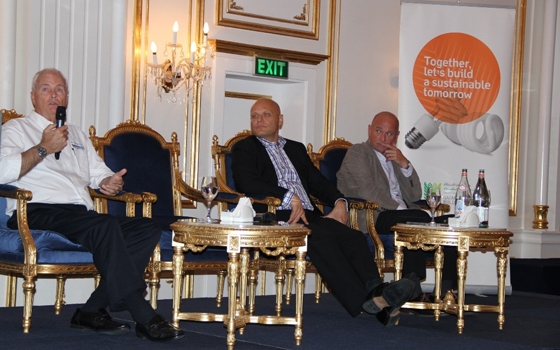Water saving solutions were at the top of the agenda at an event hosted by Qatar Green Building Council (QGBC) and the Chartered Institute of Building (CIOB).
The seminar, titled ‘Future Planning of Water Strategy,’ brought senior representatives from Qatar’s construction and sustainability industry together to examined eco-friendly and sustainable water management systems and to propose new ways to advance the treatment of water in Qatar.
The experts discussed the importance of capturing, storing, managing and re-using diverse sources of water, in order to achieve sustainable development, as the country’s population increases and demand for water supply grows.
Dr Alex Amato, Head of Sustainability at QGBC, said, “The possibility of local treatment for both black and grey water and the storage of rainwater recycled for irrigation leads us to consider if large-scale storm water and sewage infrastructure is necessary. We need to explore whether this is the time to consider the deployment of new technologies for local water treatment that can substantially improve our built environment.”
By collaborating with the prestigious Chartered Institute of Building – one of the world’s most influential professional bodies for construction management and leadership – QGBC seeks to advance green building practices that can benefit the country for generations to come. Both groups share similar values, with a clear mandate to develop, conserve, and improve the built environment.
Stephen Herd, Business Development Manager of Polypipe, emphasized the value of water management and conservation in our built environment, and explained how waste water can be utilized effectively through innovative systems and technologies.
He said, “We face numerous challenges in today’s urban environment, which includes increased water consumption, rapid urbanization, population growth, a lack of natural resources, and a host of other significant challenges. However, water can be managed and treated differently in our built environment. The conventional approach to storm water management is treating rainfall as waste rather than as a resource, but sustainable storm water design treats rainfall runoff as a valuable resource.”
Andrew Ford, Operations Manager at Gulf Contracting Company, shed light on the benefits associated with decentralized solutions that have been designed to preserve the natural environment, such as waste water treatment and re-use, which is both cost-effective and environmentally-sustainable.
He explained, “Innovation is about using alternative ways of managing waste water to meet the current demands of production and population growth. It looks at the current situation in relation to the wider network and compares the advantages of treating waste water locally rather than centrally, in order to reduce the burden on the centralized network. It also offers environmentally-friendly alternatives to localized treatment options. This ultimately satisfies the objectives of Qatar National Vision 2030 by allowing future generations to sustain their country’s development, while protecting the environment.”
QGBC is a non-profit, membership-driven organization dedicated to advocating green building solutions, leading industry research, as well as promoting sustainable practice in the community. Through QGBC, Qatar has joined a network of 80 different countries that run active national green building councils under the umbrella of the World Green Building Council.
ifpinfo
20 November






















































